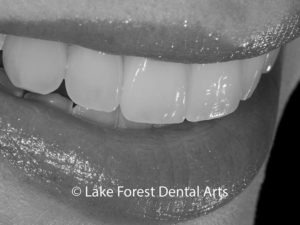
Porcelain veneers can correct a multitude of dental issues ranging from chipped or broken teeth to severely stained or discolored teeth. If your veneers are creating a new issue like bad breath then it’s time to see your dentist for treatment. Do veneers make your breath smell? It’s possible, but several more factors may be responsible.
Bad breath, also known as halitosis, can have a detrimental effect on your social life. It can drastically affect your self confidence and cause you to be extremely insecure when speaking to others.
Dr. James Fondriest is a highly knowledgeable cosmetic dentist that can assess your teeth and find the source of the smell and provide recommendations on how to eliminate it.
Do veneers make your breath smell?
One of the first questions your dentist will ask you is if you noticed a smell before or after your veneers were installed. If you began to notice an unpleasant smell emitting from your mouth after they were installed then it’s time to locate the source.
What is responsible for my bad breath?
Like natural teeth, poor oral hygiene around veneers will make your breath smell
Poor oral hygiene can lead to sour breath. Dentists recommend that you brush your teeth at least two times per day and floss on a regular basis.
Trapped food in your teeth is a breeding ground for bacteria. This same bacteria can be responsible for foul smells.
If possible, brushing and flossing immediately after a meal can remove food particles from your teeth and leave your breath smelling minty fresh. The quicker food debris is removed from your mouth the less likely it is to cause bad smells.
Poor fit on veneers will cause bad breath
If your dental veneers are poorly fitted over your natural teeth then it is possible that food and bacteria are getting trapped in between your teeth and the veneers. The only way to determine if this is the issue is by having your dentist examine your teeth and gums. If the veneers are not fitted properly you may need a new pair in order to eliminate bad breath and other potential issues.
Gum disease around your veneers will make your breath smell
If your veneers are not responsible for your bad breath, your gums could be the culprit. Regardless if you have veneers or not, your gums can get infected and inflamed from bacteria in the mouth. This can be caused by plaque buildup and poor brushing or flossing.
Signs of gum disease include gums that bleed easily and pain while brushing. It is best to contact a dentist as soon as possible. If left untreated, gum disease can lead to tooth decay and eventual tooth loss.
Tooth decay
While your veneers make your teeth look great from the front, there may be a more serious issue lurking behind the scenes. Your dentist can assess your oral health and check for cavities. Decay is harder to spot under veneers. Decay is also caused by oral bacteria and therefore has odors.
Signs of a cavity include tooth sensitivity, dental pain, or discolored teeth. A hole or pit in the tooth can also indicate that a cavity is present.
If a cavity is found your dentist may suggest a filling. Depending on the severity of the cavity you may also need to replace your veneer with a crown.
How can my bad breath be fixed?
The good news is that most instances of bad breath are treatable. Correcting bad breath depends on the source Dr. Fondriest can use various methods to help eliminate the odor.
Deep cleaning
A deep cleaning is performed when gum disease is present. Dental scaling is another name for a deep cleaning.
During a routine cleaning the dental hygienist simply removes built up tartar that sits along the gum line. A deep cleaning involves actually going one step further and removing tartar that has accumulated under the gum line. Removal of this tartar can help reduce swelling and allow the gums to heal. This procedure is relatively painless and depending on the condition of your teeth and gums it may be completed in one visit.
Treatments for tooth decay
Several treatments are available for teeth that have signs of decay. Fluoride treatments can help strengthen the teeth and protect the enamel. A simple dental filling may be all that you need, or more extensive treatment like a root canal or crown may be necessary. If none of these treatments are an option you may need to have the tooth extracted.
New veneers
Do your current veneers make your breath smell? Once Dr. Fondriest examines your veneers he will be able to tell if they are responsible for the bad odor. If the veneers don’t have a proper fit then you may need to consider new ones that fit correctly.
The process to replace veneers may take time, but it is worth it in the end to receive veneers that fit securely and no longer trap bacteria. Once your dentist removes the old veneers the next step is to remove all left over bonding material. Your dentist will then create a new impression of your teeth and send it off to have your new veneers made. You will receive temporary veneers while waiting on your new ones.
Improve your oral hygiene
If dental hygiene is to blame for your bad breath then this can be a relatively simple fix. Patients should focus on brushing at least twice per day. Set a reminder if necessary.
Routine visits to your dentist are also very important. Seeing your dentist at least two times a year can help identify dental concerns. Your dentist will perform X-rays and conduct a thorough examination to determine if you have any dental issues.

